MAED 107: Reflection Paper on Education Laws, Ethics, and Rizal
VerifiedAdded on 2020/10/17
|21
|6581
|831
Homework Assignment
AI Summary
This reflection paper, a final requirement for MAED 107, delves into the critical role of education laws and ethics in shaping the educational landscape. The paper examines the importance of school policies in ensuring a safe and conducive learning environment, highlighting how these policies promote positive learning, standardize operations, and protect students and staff. It then explores the legal foundation of the Philippine educational system, discussing key laws such as the Educational Decree of 1863, the Free Public Secondary Education Act of 1988, and the Higher Education Act of 1994, and their impact on access to quality education. The paper also analyzes Republic Act No. 1425, or the Rizal Law, emphasizing its significance in fostering nationalism and patriotism by teaching the life, works, and writings of Dr. Jose Rizal. Finally, it touches upon RA #7743, which established public libraries and reading centers, and its role in promoting an informed citizenry. The reflections underscore the importance of education as a fundamental right, the need for equal opportunities, and the role of future educators in upholding these principles.
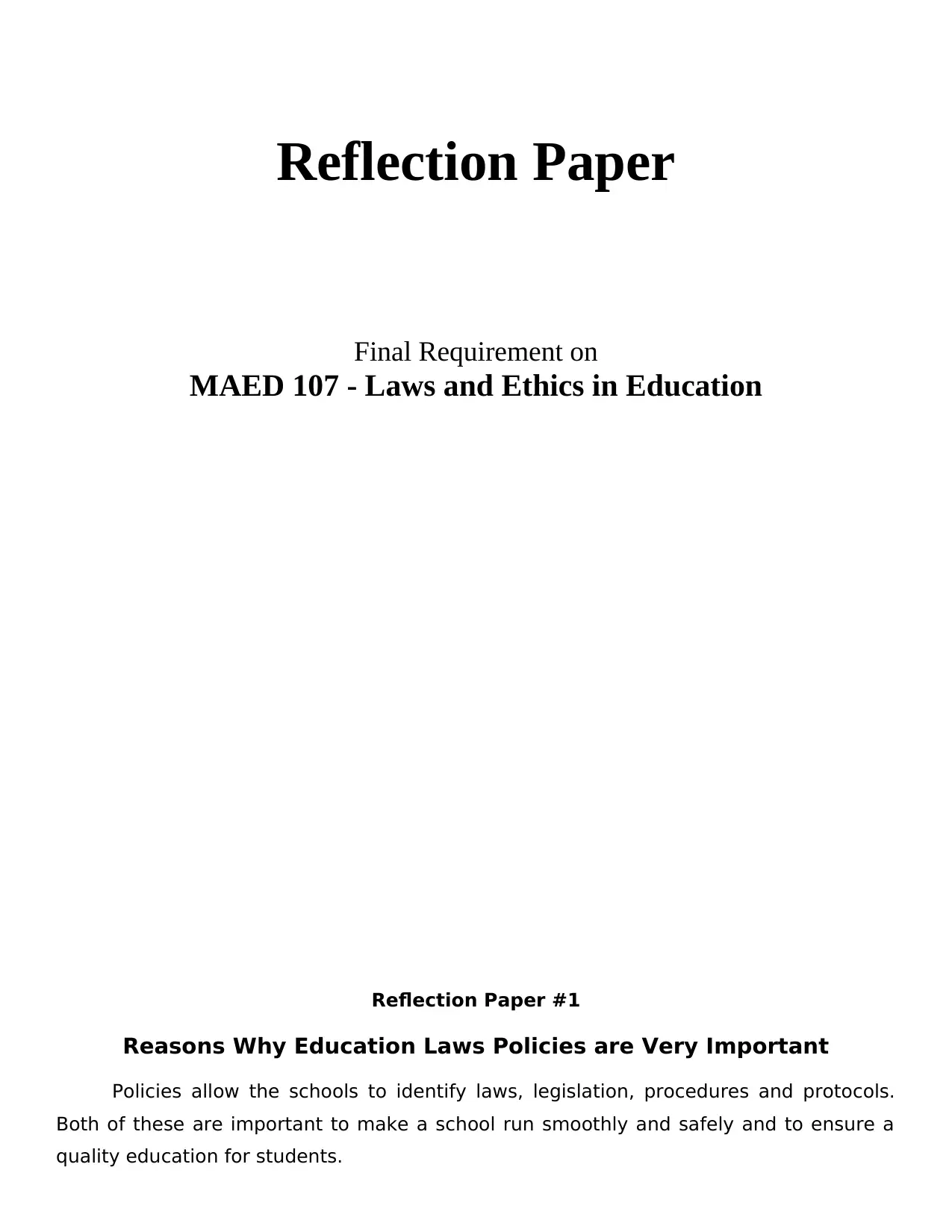
Reflection Paper
Final Requirement on
MAED 107 - Laws and Ethics in Education
Reflection Paper #1
Reasons Why Education Laws Policies are Very Important
Policies allow the schools to identify laws, legislation, procedures and protocols.
Both of these are important to make a school run smoothly and safely and to ensure a
quality education for students.
Final Requirement on
MAED 107 - Laws and Ethics in Education
Reflection Paper #1
Reasons Why Education Laws Policies are Very Important
Policies allow the schools to identify laws, legislation, procedures and protocols.
Both of these are important to make a school run smoothly and safely and to ensure a
quality education for students.
Paraphrase This Document
Need a fresh take? Get an instant paraphrase of this document with our AI Paraphraser
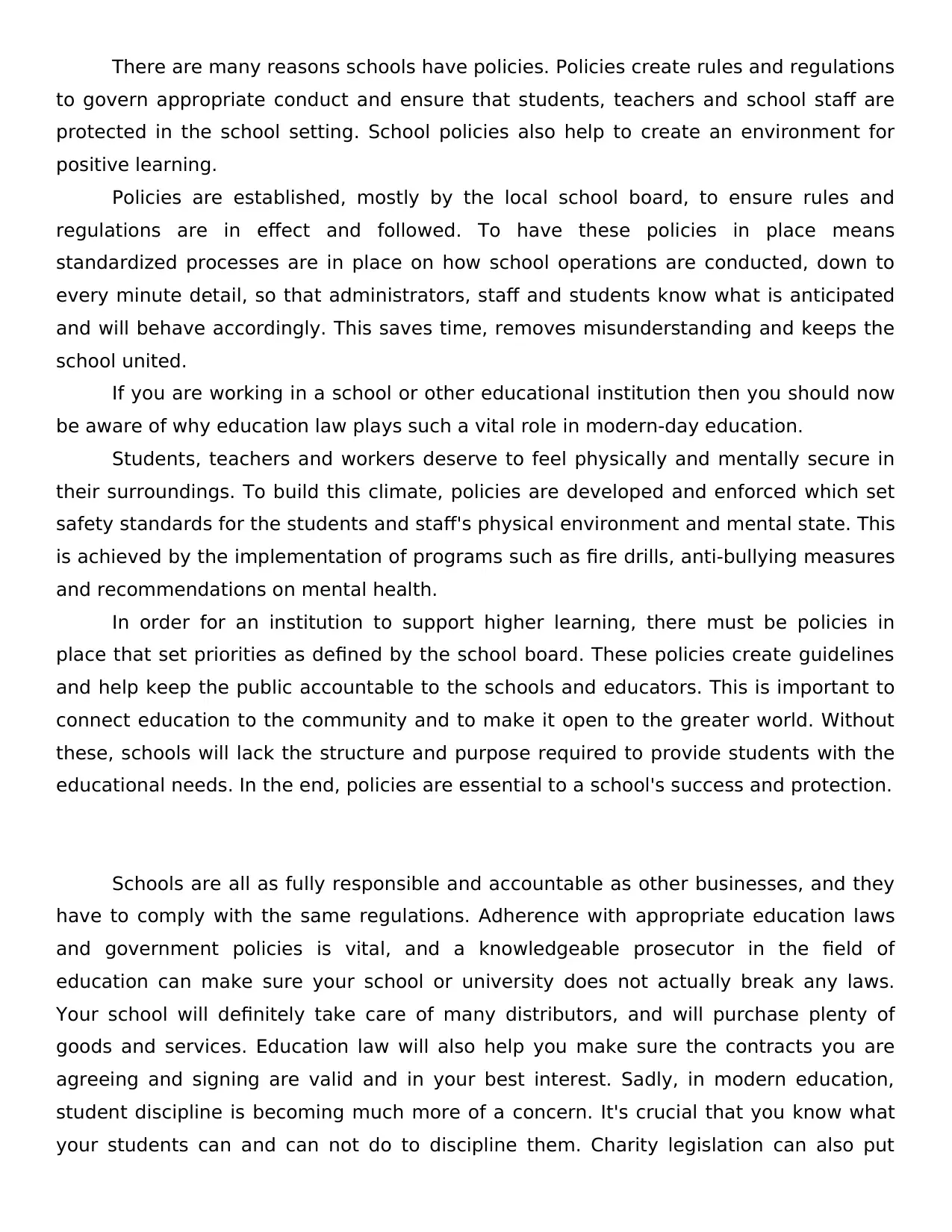
There are many reasons schools have policies. Policies create rules and regulations
to govern appropriate conduct and ensure that students, teachers and school staff are
protected in the school setting. School policies also help to create an environment for
positive learning.
Policies are established, mostly by the local school board, to ensure rules and
regulations are in effect and followed. To have these policies in place means
standardized processes are in place on how school operations are conducted, down to
every minute detail, so that administrators, staff and students know what is anticipated
and will behave accordingly. This saves time, removes misunderstanding and keeps the
school united.
If you are working in a school or other educational institution then you should now
be aware of why education law plays such a vital role in modern-day education.
Students, teachers and workers deserve to feel physically and mentally secure in
their surroundings. To build this climate, policies are developed and enforced which set
safety standards for the students and staff's physical environment and mental state. This
is achieved by the implementation of programs such as fire drills, anti-bullying measures
and recommendations on mental health.
In order for an institution to support higher learning, there must be policies in
place that set priorities as defined by the school board. These policies create guidelines
and help keep the public accountable to the schools and educators. This is important to
connect education to the community and to make it open to the greater world. Without
these, schools will lack the structure and purpose required to provide students with the
educational needs. In the end, policies are essential to a school's success and protection.
Schools are all as fully responsible and accountable as other businesses, and they
have to comply with the same regulations. Adherence with appropriate education laws
and government policies is vital, and a knowledgeable prosecutor in the field of
education can make sure your school or university does not actually break any laws.
Your school will definitely take care of many distributors, and will purchase plenty of
goods and services. Education law will also help you make sure the contracts you are
agreeing and signing are valid and in your best interest. Sadly, in modern education,
student discipline is becoming much more of a concern. It's crucial that you know what
your students can and can not do to discipline them. Charity legislation can also put
to govern appropriate conduct and ensure that students, teachers and school staff are
protected in the school setting. School policies also help to create an environment for
positive learning.
Policies are established, mostly by the local school board, to ensure rules and
regulations are in effect and followed. To have these policies in place means
standardized processes are in place on how school operations are conducted, down to
every minute detail, so that administrators, staff and students know what is anticipated
and will behave accordingly. This saves time, removes misunderstanding and keeps the
school united.
If you are working in a school or other educational institution then you should now
be aware of why education law plays such a vital role in modern-day education.
Students, teachers and workers deserve to feel physically and mentally secure in
their surroundings. To build this climate, policies are developed and enforced which set
safety standards for the students and staff's physical environment and mental state. This
is achieved by the implementation of programs such as fire drills, anti-bullying measures
and recommendations on mental health.
In order for an institution to support higher learning, there must be policies in
place that set priorities as defined by the school board. These policies create guidelines
and help keep the public accountable to the schools and educators. This is important to
connect education to the community and to make it open to the greater world. Without
these, schools will lack the structure and purpose required to provide students with the
educational needs. In the end, policies are essential to a school's success and protection.
Schools are all as fully responsible and accountable as other businesses, and they
have to comply with the same regulations. Adherence with appropriate education laws
and government policies is vital, and a knowledgeable prosecutor in the field of
education can make sure your school or university does not actually break any laws.
Your school will definitely take care of many distributors, and will purchase plenty of
goods and services. Education law will also help you make sure the contracts you are
agreeing and signing are valid and in your best interest. Sadly, in modern education,
student discipline is becoming much more of a concern. It's crucial that you know what
your students can and can not do to discipline them. Charity legislation can also put
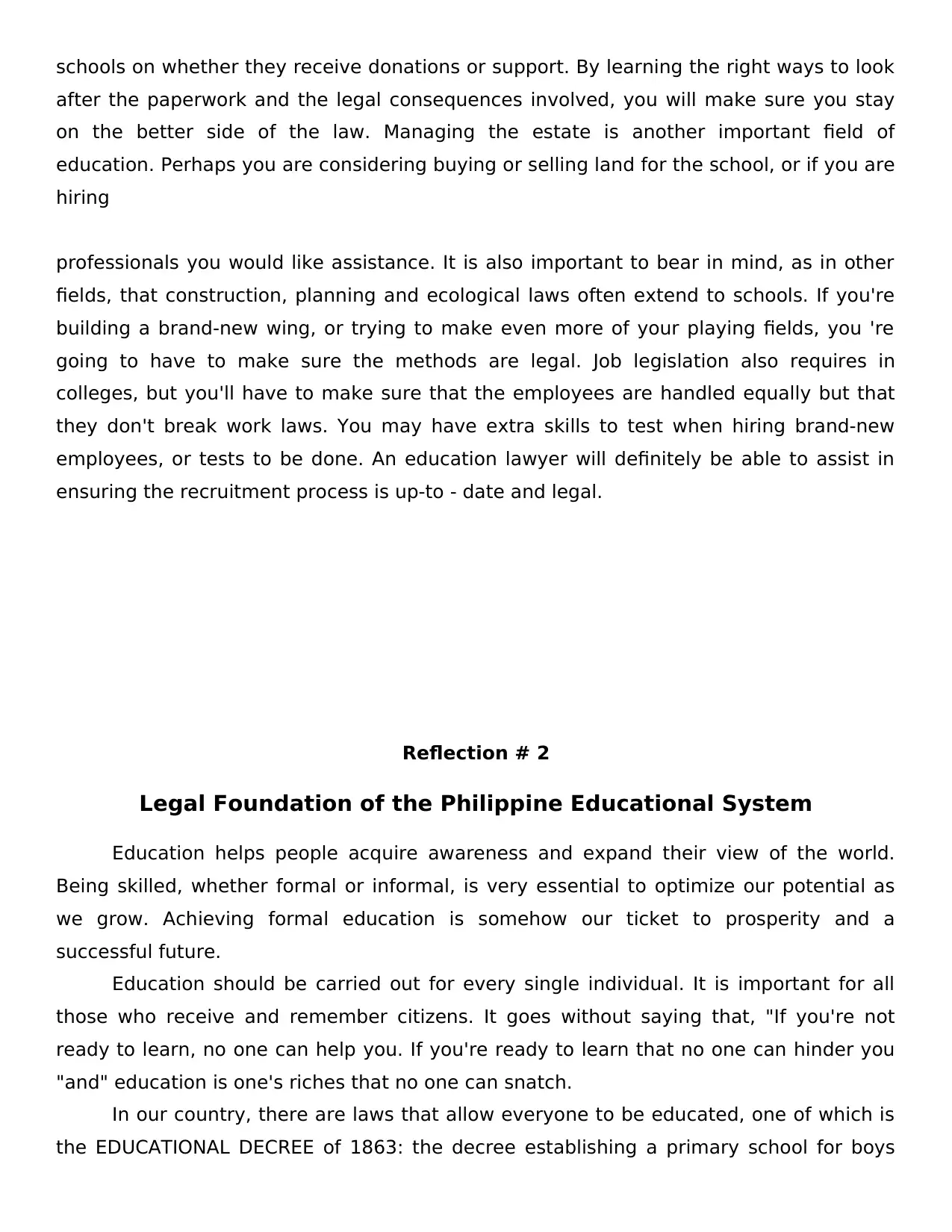
schools on whether they receive donations or support. By learning the right ways to look
after the paperwork and the legal consequences involved, you will make sure you stay
on the better side of the law. Managing the estate is another important field of
education. Perhaps you are considering buying or selling land for the school, or if you are
hiring
professionals you would like assistance. It is also important to bear in mind, as in other
fields, that construction, planning and ecological laws often extend to schools. If you're
building a brand-new wing, or trying to make even more of your playing fields, you 're
going to have to make sure the methods are legal. Job legislation also requires in
colleges, but you'll have to make sure that the employees are handled equally but that
they don't break work laws. You may have extra skills to test when hiring brand-new
employees, or tests to be done. An education lawyer will definitely be able to assist in
ensuring the recruitment process is up-to - date and legal.
Reflection # 2
Legal Foundation of the Philippine Educational System
Education helps people acquire awareness and expand their view of the world.
Being skilled, whether formal or informal, is very essential to optimize our potential as
we grow. Achieving formal education is somehow our ticket to prosperity and a
successful future.
Education should be carried out for every single individual. It is important for all
those who receive and remember citizens. It goes without saying that, "If you're not
ready to learn, no one can help you. If you're ready to learn that no one can hinder you
"and" education is one's riches that no one can snatch.
In our country, there are laws that allow everyone to be educated, one of which is
the EDUCATIONAL DECREE of 1863: the decree establishing a primary school for boys
after the paperwork and the legal consequences involved, you will make sure you stay
on the better side of the law. Managing the estate is another important field of
education. Perhaps you are considering buying or selling land for the school, or if you are
hiring
professionals you would like assistance. It is also important to bear in mind, as in other
fields, that construction, planning and ecological laws often extend to schools. If you're
building a brand-new wing, or trying to make even more of your playing fields, you 're
going to have to make sure the methods are legal. Job legislation also requires in
colleges, but you'll have to make sure that the employees are handled equally but that
they don't break work laws. You may have extra skills to test when hiring brand-new
employees, or tests to be done. An education lawyer will definitely be able to assist in
ensuring the recruitment process is up-to - date and legal.
Reflection # 2
Legal Foundation of the Philippine Educational System
Education helps people acquire awareness and expand their view of the world.
Being skilled, whether formal or informal, is very essential to optimize our potential as
we grow. Achieving formal education is somehow our ticket to prosperity and a
successful future.
Education should be carried out for every single individual. It is important for all
those who receive and remember citizens. It goes without saying that, "If you're not
ready to learn, no one can help you. If you're ready to learn that no one can hinder you
"and" education is one's riches that no one can snatch.
In our country, there are laws that allow everyone to be educated, one of which is
the EDUCATIONAL DECREE of 1863: the decree establishing a primary school for boys
⊘ This is a preview!⊘
Do you want full access?
Subscribe today to unlock all pages.

Trusted by 1+ million students worldwide
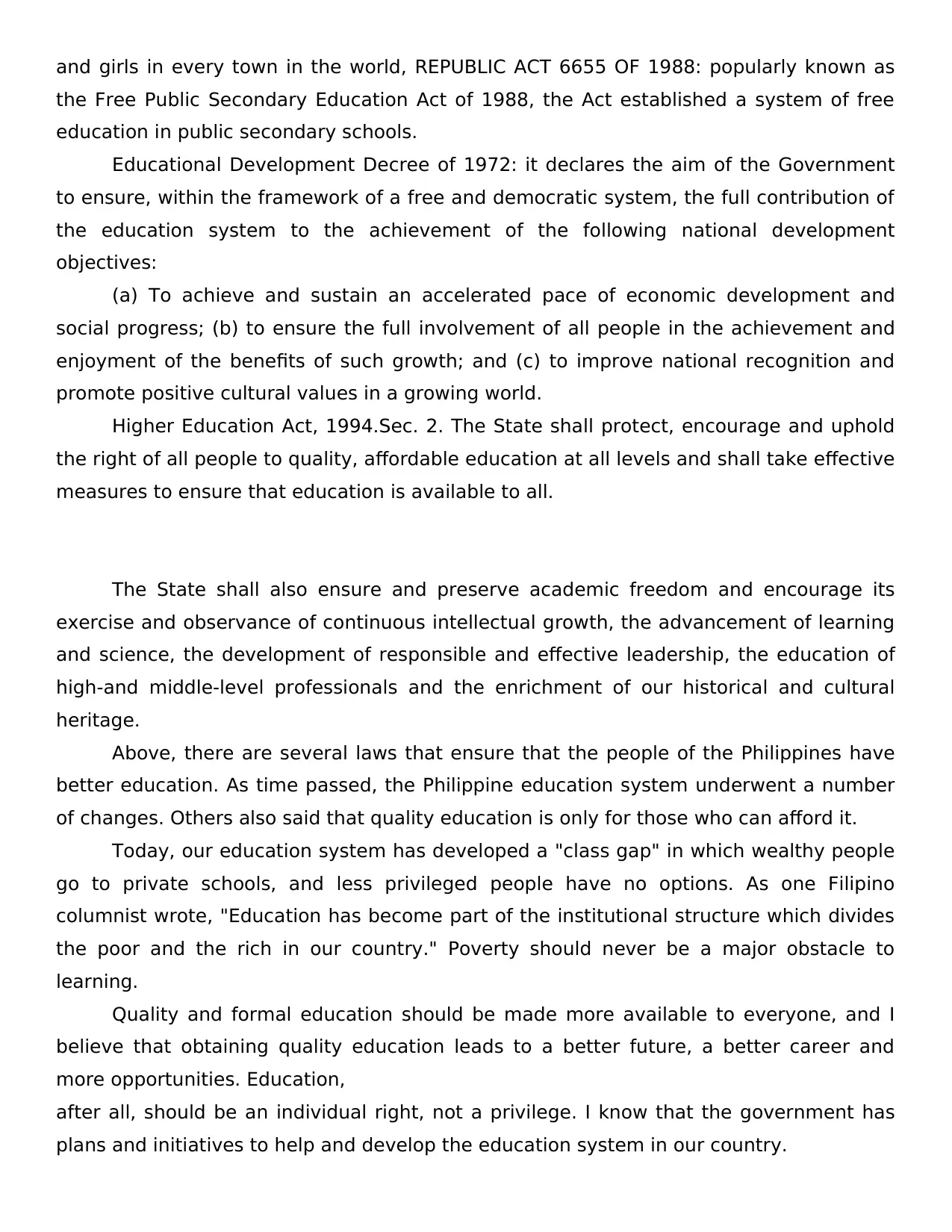
and girls in every town in the world, REPUBLIC ACT 6655 OF 1988: popularly known as
the Free Public Secondary Education Act of 1988, the Act established a system of free
education in public secondary schools.
Educational Development Decree of 1972: it declares the aim of the Government
to ensure, within the framework of a free and democratic system, the full contribution of
the education system to the achievement of the following national development
objectives:
(a) To achieve and sustain an accelerated pace of economic development and
social progress; (b) to ensure the full involvement of all people in the achievement and
enjoyment of the benefits of such growth; and (c) to improve national recognition and
promote positive cultural values in a growing world.
Higher Education Act, 1994.Sec. 2. The State shall protect, encourage and uphold
the right of all people to quality, affordable education at all levels and shall take effective
measures to ensure that education is available to all.
The State shall also ensure and preserve academic freedom and encourage its
exercise and observance of continuous intellectual growth, the advancement of learning
and science, the development of responsible and effective leadership, the education of
high-and middle-level professionals and the enrichment of our historical and cultural
heritage.
Above, there are several laws that ensure that the people of the Philippines have
better education. As time passed, the Philippine education system underwent a number
of changes. Others also said that quality education is only for those who can afford it.
Today, our education system has developed a "class gap" in which wealthy people
go to private schools, and less privileged people have no options. As one Filipino
columnist wrote, "Education has become part of the institutional structure which divides
the poor and the rich in our country." Poverty should never be a major obstacle to
learning.
Quality and formal education should be made more available to everyone, and I
believe that obtaining quality education leads to a better future, a better career and
more opportunities. Education,
after all, should be an individual right, not a privilege. I know that the government has
plans and initiatives to help and develop the education system in our country.
the Free Public Secondary Education Act of 1988, the Act established a system of free
education in public secondary schools.
Educational Development Decree of 1972: it declares the aim of the Government
to ensure, within the framework of a free and democratic system, the full contribution of
the education system to the achievement of the following national development
objectives:
(a) To achieve and sustain an accelerated pace of economic development and
social progress; (b) to ensure the full involvement of all people in the achievement and
enjoyment of the benefits of such growth; and (c) to improve national recognition and
promote positive cultural values in a growing world.
Higher Education Act, 1994.Sec. 2. The State shall protect, encourage and uphold
the right of all people to quality, affordable education at all levels and shall take effective
measures to ensure that education is available to all.
The State shall also ensure and preserve academic freedom and encourage its
exercise and observance of continuous intellectual growth, the advancement of learning
and science, the development of responsible and effective leadership, the education of
high-and middle-level professionals and the enrichment of our historical and cultural
heritage.
Above, there are several laws that ensure that the people of the Philippines have
better education. As time passed, the Philippine education system underwent a number
of changes. Others also said that quality education is only for those who can afford it.
Today, our education system has developed a "class gap" in which wealthy people
go to private schools, and less privileged people have no options. As one Filipino
columnist wrote, "Education has become part of the institutional structure which divides
the poor and the rich in our country." Poverty should never be a major obstacle to
learning.
Quality and formal education should be made more available to everyone, and I
believe that obtaining quality education leads to a better future, a better career and
more opportunities. Education,
after all, should be an individual right, not a privilege. I know that the government has
plans and initiatives to help and develop the education system in our country.
Paraphrase This Document
Need a fresh take? Get an instant paraphrase of this document with our AI Paraphraser
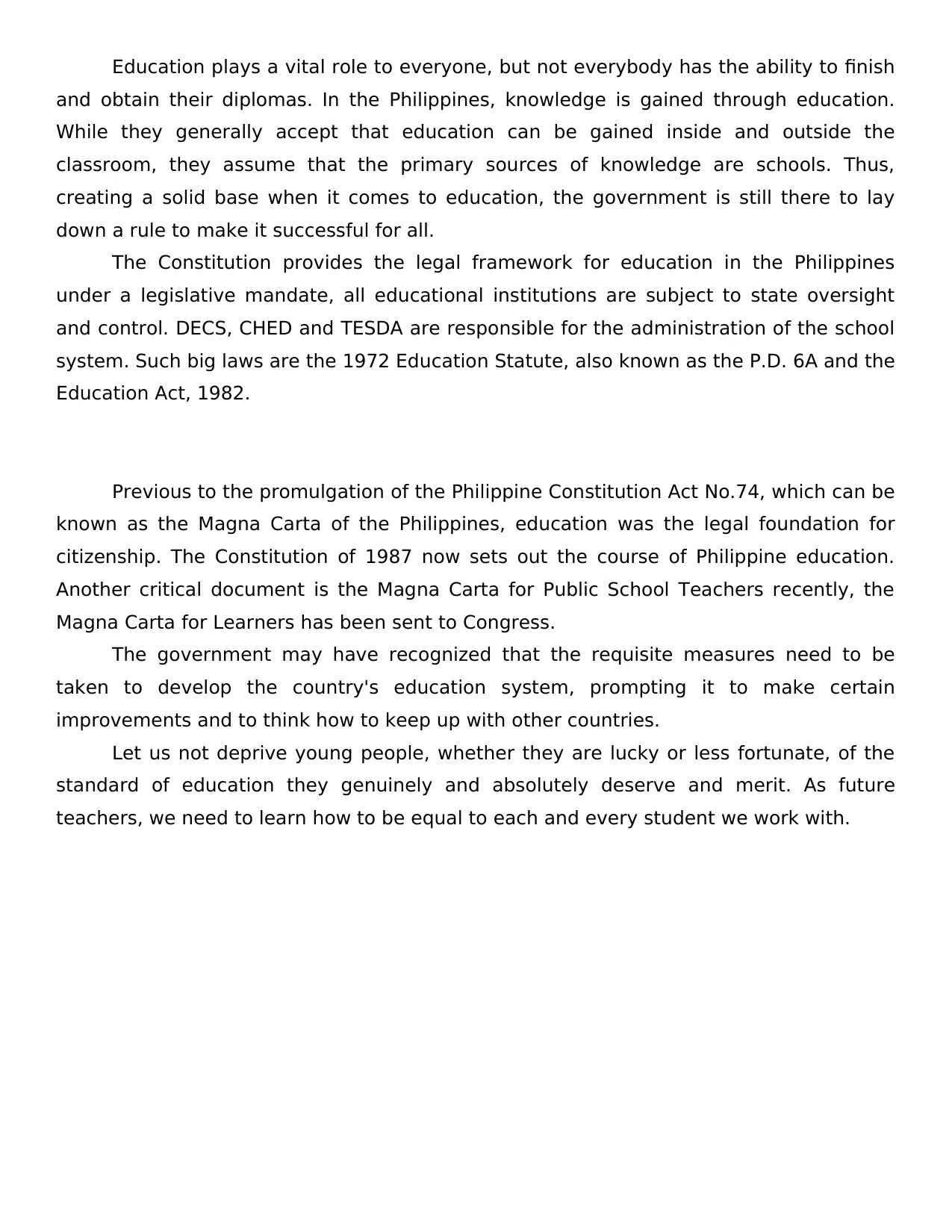
Education plays a vital role to everyone, but not everybody has the ability to finish
and obtain their diplomas. In the Philippines, knowledge is gained through education.
While they generally accept that education can be gained inside and outside the
classroom, they assume that the primary sources of knowledge are schools. Thus,
creating a solid base when it comes to education, the government is still there to lay
down a rule to make it successful for all.
The Constitution provides the legal framework for education in the Philippines
under a legislative mandate, all educational institutions are subject to state oversight
and control. DECS, CHED and TESDA are responsible for the administration of the school
system. Such big laws are the 1972 Education Statute, also known as the P.D. 6A and the
Education Act, 1982.
Previous to the promulgation of the Philippine Constitution Act No.74, which can be
known as the Magna Carta of the Philippines, education was the legal foundation for
citizenship. The Constitution of 1987 now sets out the course of Philippine education.
Another critical document is the Magna Carta for Public School Teachers recently, the
Magna Carta for Learners has been sent to Congress.
The government may have recognized that the requisite measures need to be
taken to develop the country's education system, prompting it to make certain
improvements and to think how to keep up with other countries.
Let us not deprive young people, whether they are lucky or less fortunate, of the
standard of education they genuinely and absolutely deserve and merit. As future
teachers, we need to learn how to be equal to each and every student we work with.
and obtain their diplomas. In the Philippines, knowledge is gained through education.
While they generally accept that education can be gained inside and outside the
classroom, they assume that the primary sources of knowledge are schools. Thus,
creating a solid base when it comes to education, the government is still there to lay
down a rule to make it successful for all.
The Constitution provides the legal framework for education in the Philippines
under a legislative mandate, all educational institutions are subject to state oversight
and control. DECS, CHED and TESDA are responsible for the administration of the school
system. Such big laws are the 1972 Education Statute, also known as the P.D. 6A and the
Education Act, 1982.
Previous to the promulgation of the Philippine Constitution Act No.74, which can be
known as the Magna Carta of the Philippines, education was the legal foundation for
citizenship. The Constitution of 1987 now sets out the course of Philippine education.
Another critical document is the Magna Carta for Public School Teachers recently, the
Magna Carta for Learners has been sent to Congress.
The government may have recognized that the requisite measures need to be
taken to develop the country's education system, prompting it to make certain
improvements and to think how to keep up with other countries.
Let us not deprive young people, whether they are lucky or less fortunate, of the
standard of education they genuinely and absolutely deserve and merit. As future
teachers, we need to learn how to be equal to each and every student we work with.
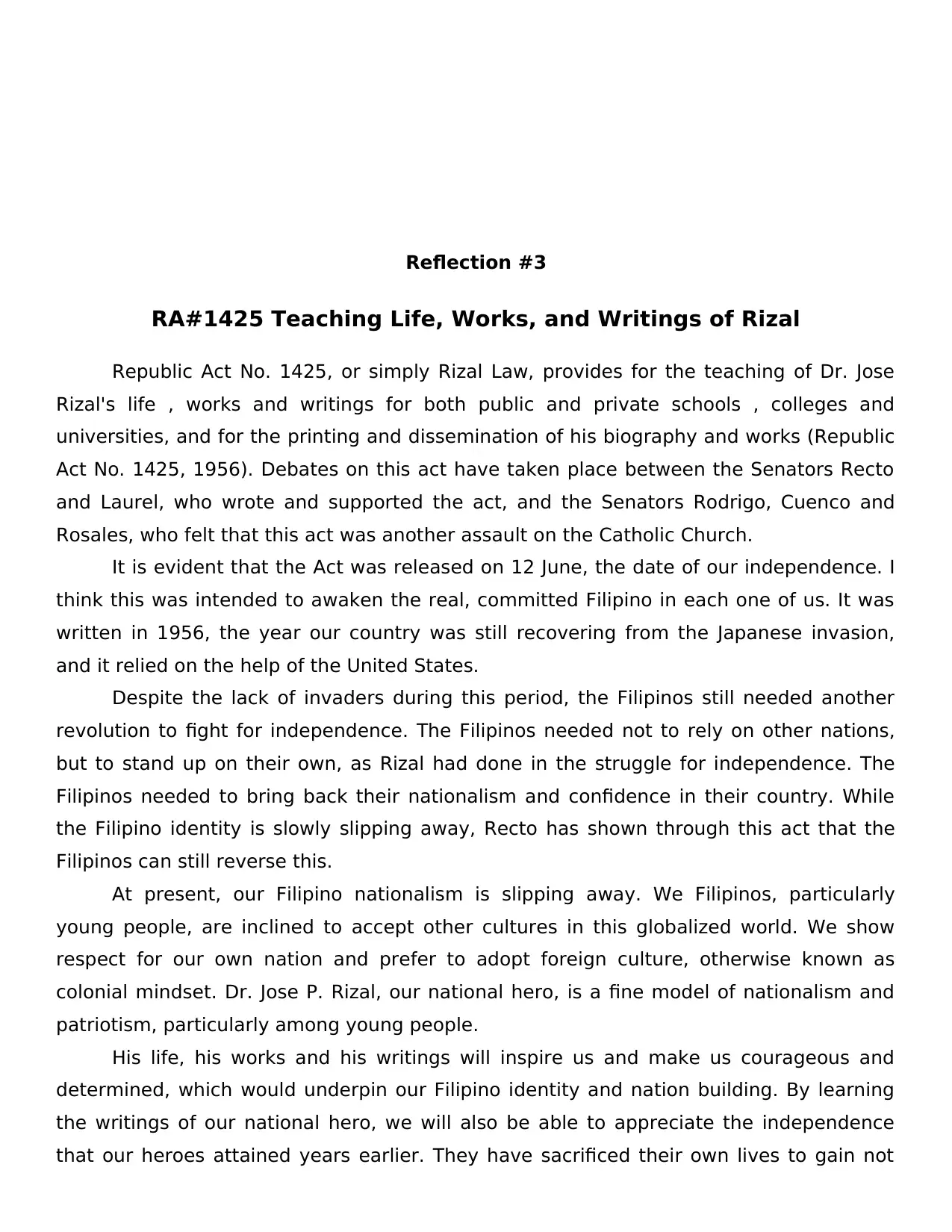
Reflection #3
RA#1425 Teaching Life, Works, and Writings of Rizal
Republic Act No. 1425, or simply Rizal Law, provides for the teaching of Dr. Jose
Rizal's life , works and writings for both public and private schools , colleges and
universities, and for the printing and dissemination of his biography and works (Republic
Act No. 1425, 1956). Debates on this act have taken place between the Senators Recto
and Laurel, who wrote and supported the act, and the Senators Rodrigo, Cuenco and
Rosales, who felt that this act was another assault on the Catholic Church.
It is evident that the Act was released on 12 June, the date of our independence. I
think this was intended to awaken the real, committed Filipino in each one of us. It was
written in 1956, the year our country was still recovering from the Japanese invasion,
and it relied on the help of the United States.
Despite the lack of invaders during this period, the Filipinos still needed another
revolution to fight for independence. The Filipinos needed not to rely on other nations,
but to stand up on their own, as Rizal had done in the struggle for independence. The
Filipinos needed to bring back their nationalism and confidence in their country. While
the Filipino identity is slowly slipping away, Recto has shown through this act that the
Filipinos can still reverse this.
At present, our Filipino nationalism is slipping away. We Filipinos, particularly
young people, are inclined to accept other cultures in this globalized world. We show
respect for our own nation and prefer to adopt foreign culture, otherwise known as
colonial mindset. Dr. Jose P. Rizal, our national hero, is a fine model of nationalism and
patriotism, particularly among young people.
His life, his works and his writings will inspire us and make us courageous and
determined, which would underpin our Filipino identity and nation building. By learning
the writings of our national hero, we will also be able to appreciate the independence
that our heroes attained years earlier. They have sacrificed their own lives to gain not
RA#1425 Teaching Life, Works, and Writings of Rizal
Republic Act No. 1425, or simply Rizal Law, provides for the teaching of Dr. Jose
Rizal's life , works and writings for both public and private schools , colleges and
universities, and for the printing and dissemination of his biography and works (Republic
Act No. 1425, 1956). Debates on this act have taken place between the Senators Recto
and Laurel, who wrote and supported the act, and the Senators Rodrigo, Cuenco and
Rosales, who felt that this act was another assault on the Catholic Church.
It is evident that the Act was released on 12 June, the date of our independence. I
think this was intended to awaken the real, committed Filipino in each one of us. It was
written in 1956, the year our country was still recovering from the Japanese invasion,
and it relied on the help of the United States.
Despite the lack of invaders during this period, the Filipinos still needed another
revolution to fight for independence. The Filipinos needed not to rely on other nations,
but to stand up on their own, as Rizal had done in the struggle for independence. The
Filipinos needed to bring back their nationalism and confidence in their country. While
the Filipino identity is slowly slipping away, Recto has shown through this act that the
Filipinos can still reverse this.
At present, our Filipino nationalism is slipping away. We Filipinos, particularly
young people, are inclined to accept other cultures in this globalized world. We show
respect for our own nation and prefer to adopt foreign culture, otherwise known as
colonial mindset. Dr. Jose P. Rizal, our national hero, is a fine model of nationalism and
patriotism, particularly among young people.
His life, his works and his writings will inspire us and make us courageous and
determined, which would underpin our Filipino identity and nation building. By learning
the writings of our national hero, we will also be able to appreciate the independence
that our heroes attained years earlier. They have sacrificed their own lives to gain not
⊘ This is a preview!⊘
Do you want full access?
Subscribe today to unlock all pages.

Trusted by 1+ million students worldwide
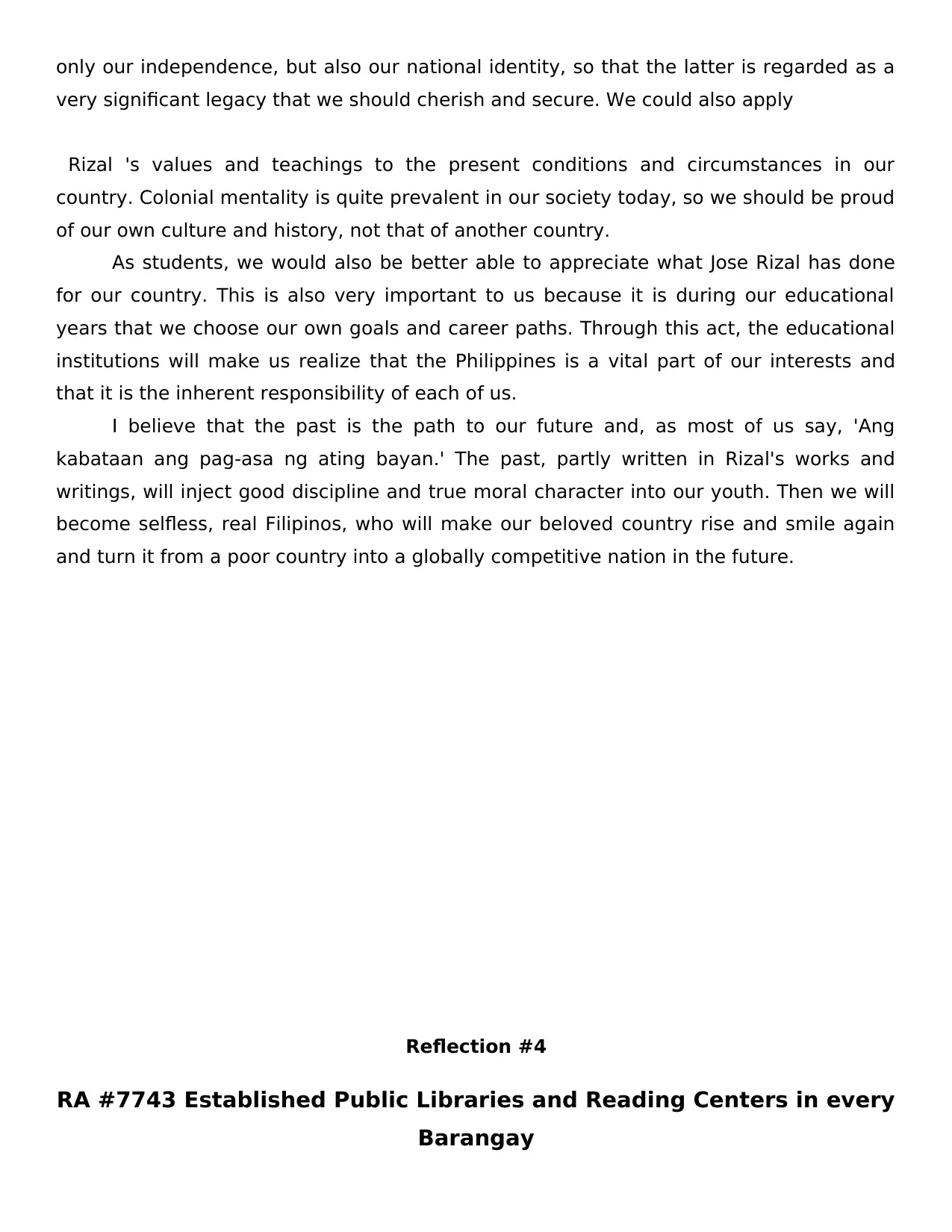
only our independence, but also our national identity, so that the latter is regarded as a
very significant legacy that we should cherish and secure. We could also apply
Rizal 's values and teachings to the present conditions and circumstances in our
country. Colonial mentality is quite prevalent in our society today, so we should be proud
of our own culture and history, not that of another country.
As students, we would also be better able to appreciate what Jose Rizal has done
for our country. This is also very important to us because it is during our educational
years that we choose our own goals and career paths. Through this act, the educational
institutions will make us realize that the Philippines is a vital part of our interests and
that it is the inherent responsibility of each of us.
I believe that the past is the path to our future and, as most of us say, 'Ang
kabataan ang pag-asa ng ating bayan.' The past, partly written in Rizal's works and
writings, will inject good discipline and true moral character into our youth. Then we will
become selfless, real Filipinos, who will make our beloved country rise and smile again
and turn it from a poor country into a globally competitive nation in the future.
Reflection #4
RA #7743 Established Public Libraries and Reading Centers in every
Barangay
very significant legacy that we should cherish and secure. We could also apply
Rizal 's values and teachings to the present conditions and circumstances in our
country. Colonial mentality is quite prevalent in our society today, so we should be proud
of our own culture and history, not that of another country.
As students, we would also be better able to appreciate what Jose Rizal has done
for our country. This is also very important to us because it is during our educational
years that we choose our own goals and career paths. Through this act, the educational
institutions will make us realize that the Philippines is a vital part of our interests and
that it is the inherent responsibility of each of us.
I believe that the past is the path to our future and, as most of us say, 'Ang
kabataan ang pag-asa ng ating bayan.' The past, partly written in Rizal's works and
writings, will inject good discipline and true moral character into our youth. Then we will
become selfless, real Filipinos, who will make our beloved country rise and smile again
and turn it from a poor country into a globally competitive nation in the future.
Reflection #4
RA #7743 Established Public Libraries and Reading Centers in every
Barangay
Paraphrase This Document
Need a fresh take? Get an instant paraphrase of this document with our AI Paraphraser
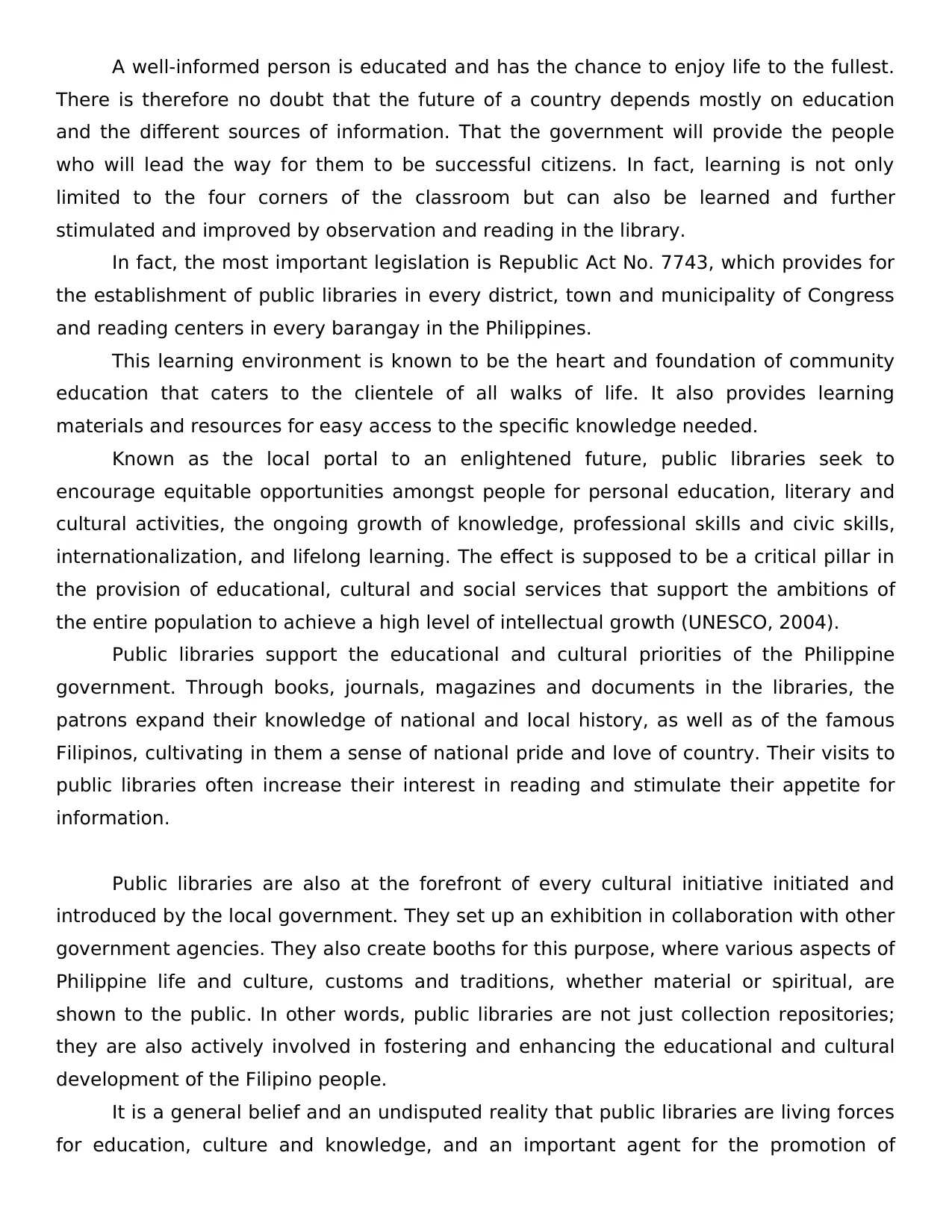
A well-informed person is educated and has the chance to enjoy life to the fullest.
There is therefore no doubt that the future of a country depends mostly on education
and the different sources of information. That the government will provide the people
who will lead the way for them to be successful citizens. In fact, learning is not only
limited to the four corners of the classroom but can also be learned and further
stimulated and improved by observation and reading in the library.
In fact, the most important legislation is Republic Act No. 7743, which provides for
the establishment of public libraries in every district, town and municipality of Congress
and reading centers in every barangay in the Philippines.
This learning environment is known to be the heart and foundation of community
education that caters to the clientele of all walks of life. It also provides learning
materials and resources for easy access to the specific knowledge needed.
Known as the local portal to an enlightened future, public libraries seek to
encourage equitable opportunities amongst people for personal education, literary and
cultural activities, the ongoing growth of knowledge, professional skills and civic skills,
internationalization, and lifelong learning. The effect is supposed to be a critical pillar in
the provision of educational, cultural and social services that support the ambitions of
the entire population to achieve a high level of intellectual growth (UNESCO, 2004).
Public libraries support the educational and cultural priorities of the Philippine
government. Through books, journals, magazines and documents in the libraries, the
patrons expand their knowledge of national and local history, as well as of the famous
Filipinos, cultivating in them a sense of national pride and love of country. Their visits to
public libraries often increase their interest in reading and stimulate their appetite for
information.
Public libraries are also at the forefront of every cultural initiative initiated and
introduced by the local government. They set up an exhibition in collaboration with other
government agencies. They also create booths for this purpose, where various aspects of
Philippine life and culture, customs and traditions, whether material or spiritual, are
shown to the public. In other words, public libraries are not just collection repositories;
they are also actively involved in fostering and enhancing the educational and cultural
development of the Filipino people.
It is a general belief and an undisputed reality that public libraries are living forces
for education, culture and knowledge, and an important agent for the promotion of
There is therefore no doubt that the future of a country depends mostly on education
and the different sources of information. That the government will provide the people
who will lead the way for them to be successful citizens. In fact, learning is not only
limited to the four corners of the classroom but can also be learned and further
stimulated and improved by observation and reading in the library.
In fact, the most important legislation is Republic Act No. 7743, which provides for
the establishment of public libraries in every district, town and municipality of Congress
and reading centers in every barangay in the Philippines.
This learning environment is known to be the heart and foundation of community
education that caters to the clientele of all walks of life. It also provides learning
materials and resources for easy access to the specific knowledge needed.
Known as the local portal to an enlightened future, public libraries seek to
encourage equitable opportunities amongst people for personal education, literary and
cultural activities, the ongoing growth of knowledge, professional skills and civic skills,
internationalization, and lifelong learning. The effect is supposed to be a critical pillar in
the provision of educational, cultural and social services that support the ambitions of
the entire population to achieve a high level of intellectual growth (UNESCO, 2004).
Public libraries support the educational and cultural priorities of the Philippine
government. Through books, journals, magazines and documents in the libraries, the
patrons expand their knowledge of national and local history, as well as of the famous
Filipinos, cultivating in them a sense of national pride and love of country. Their visits to
public libraries often increase their interest in reading and stimulate their appetite for
information.
Public libraries are also at the forefront of every cultural initiative initiated and
introduced by the local government. They set up an exhibition in collaboration with other
government agencies. They also create booths for this purpose, where various aspects of
Philippine life and culture, customs and traditions, whether material or spiritual, are
shown to the public. In other words, public libraries are not just collection repositories;
they are also actively involved in fostering and enhancing the educational and cultural
development of the Filipino people.
It is a general belief and an undisputed reality that public libraries are living forces
for education, culture and knowledge, and an important agent for the promotion of
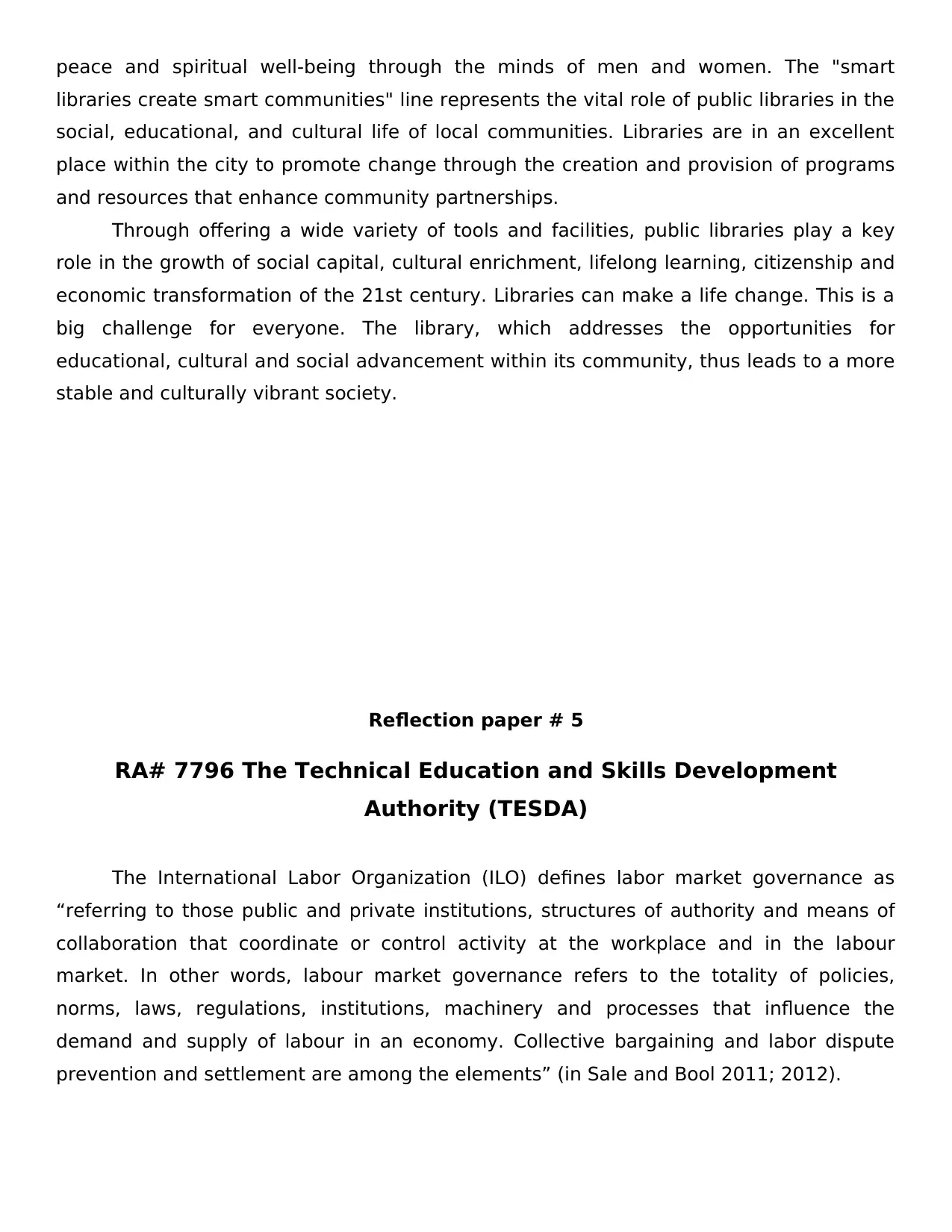
peace and spiritual well-being through the minds of men and women. The "smart
libraries create smart communities" line represents the vital role of public libraries in the
social, educational, and cultural life of local communities. Libraries are in an excellent
place within the city to promote change through the creation and provision of programs
and resources that enhance community partnerships.
Through offering a wide variety of tools and facilities, public libraries play a key
role in the growth of social capital, cultural enrichment, lifelong learning, citizenship and
economic transformation of the 21st century. Libraries can make a life change. This is a
big challenge for everyone. The library, which addresses the opportunities for
educational, cultural and social advancement within its community, thus leads to a more
stable and culturally vibrant society.
Reflection paper # 5
RA# 7796 The Technical Education and Skills Development
Authority (TESDA)
The International Labor Organization (ILO) defines labor market governance as
“referring to those public and private institutions, structures of authority and means of
collaboration that coordinate or control activity at the workplace and in the labour
market. In other words, labour market governance refers to the totality of policies,
norms, laws, regulations, institutions, machinery and processes that influence the
demand and supply of labour in an economy. Collective bargaining and labor dispute
prevention and settlement are among the elements” (in Sale and Bool 2011; 2012).
libraries create smart communities" line represents the vital role of public libraries in the
social, educational, and cultural life of local communities. Libraries are in an excellent
place within the city to promote change through the creation and provision of programs
and resources that enhance community partnerships.
Through offering a wide variety of tools and facilities, public libraries play a key
role in the growth of social capital, cultural enrichment, lifelong learning, citizenship and
economic transformation of the 21st century. Libraries can make a life change. This is a
big challenge for everyone. The library, which addresses the opportunities for
educational, cultural and social advancement within its community, thus leads to a more
stable and culturally vibrant society.
Reflection paper # 5
RA# 7796 The Technical Education and Skills Development
Authority (TESDA)
The International Labor Organization (ILO) defines labor market governance as
“referring to those public and private institutions, structures of authority and means of
collaboration that coordinate or control activity at the workplace and in the labour
market. In other words, labour market governance refers to the totality of policies,
norms, laws, regulations, institutions, machinery and processes that influence the
demand and supply of labour in an economy. Collective bargaining and labor dispute
prevention and settlement are among the elements” (in Sale and Bool 2011; 2012).
⊘ This is a preview!⊘
Do you want full access?
Subscribe today to unlock all pages.

Trusted by 1+ million students worldwide
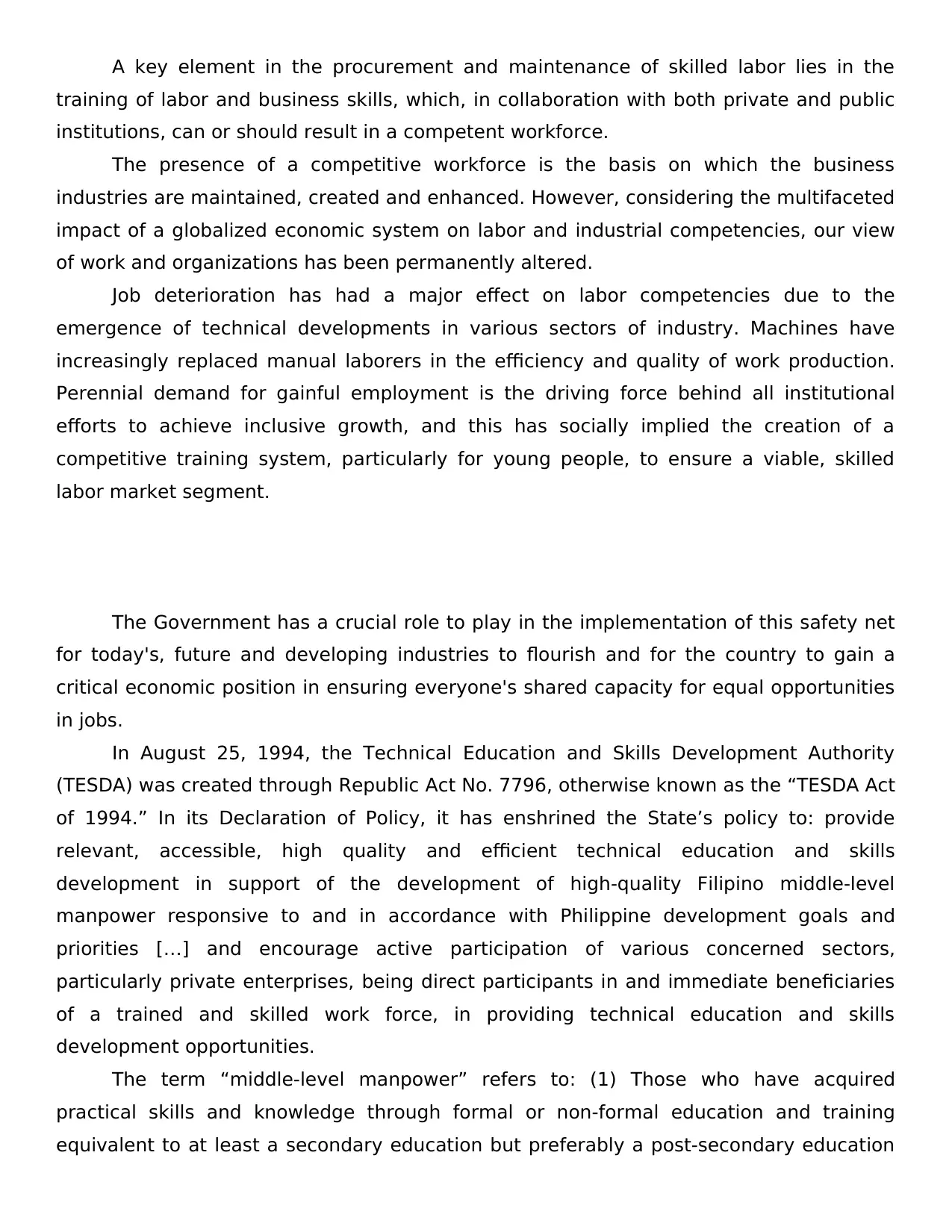
A key element in the procurement and maintenance of skilled labor lies in the
training of labor and business skills, which, in collaboration with both private and public
institutions, can or should result in a competent workforce.
The presence of a competitive workforce is the basis on which the business
industries are maintained, created and enhanced. However, considering the multifaceted
impact of a globalized economic system on labor and industrial competencies, our view
of work and organizations has been permanently altered.
Job deterioration has had a major effect on labor competencies due to the
emergence of technical developments in various sectors of industry. Machines have
increasingly replaced manual laborers in the efficiency and quality of work production.
Perennial demand for gainful employment is the driving force behind all institutional
efforts to achieve inclusive growth, and this has socially implied the creation of a
competitive training system, particularly for young people, to ensure a viable, skilled
labor market segment.
The Government has a crucial role to play in the implementation of this safety net
for today's, future and developing industries to flourish and for the country to gain a
critical economic position in ensuring everyone's shared capacity for equal opportunities
in jobs.
In August 25, 1994, the Technical Education and Skills Development Authority
(TESDA) was created through Republic Act No. 7796, otherwise known as the “TESDA Act
of 1994.” In its Declaration of Policy, it has enshrined the State’s policy to: provide
relevant, accessible, high quality and efficient technical education and skills
development in support of the development of high-quality Filipino middle-level
manpower responsive to and in accordance with Philippine development goals and
priorities […] and encourage active participation of various concerned sectors,
particularly private enterprises, being direct participants in and immediate beneficiaries
of a trained and skilled work force, in providing technical education and skills
development opportunities.
The term “middle-level manpower” refers to: (1) Those who have acquired
practical skills and knowledge through formal or non-formal education and training
equivalent to at least a secondary education but preferably a post-secondary education
training of labor and business skills, which, in collaboration with both private and public
institutions, can or should result in a competent workforce.
The presence of a competitive workforce is the basis on which the business
industries are maintained, created and enhanced. However, considering the multifaceted
impact of a globalized economic system on labor and industrial competencies, our view
of work and organizations has been permanently altered.
Job deterioration has had a major effect on labor competencies due to the
emergence of technical developments in various sectors of industry. Machines have
increasingly replaced manual laborers in the efficiency and quality of work production.
Perennial demand for gainful employment is the driving force behind all institutional
efforts to achieve inclusive growth, and this has socially implied the creation of a
competitive training system, particularly for young people, to ensure a viable, skilled
labor market segment.
The Government has a crucial role to play in the implementation of this safety net
for today's, future and developing industries to flourish and for the country to gain a
critical economic position in ensuring everyone's shared capacity for equal opportunities
in jobs.
In August 25, 1994, the Technical Education and Skills Development Authority
(TESDA) was created through Republic Act No. 7796, otherwise known as the “TESDA Act
of 1994.” In its Declaration of Policy, it has enshrined the State’s policy to: provide
relevant, accessible, high quality and efficient technical education and skills
development in support of the development of high-quality Filipino middle-level
manpower responsive to and in accordance with Philippine development goals and
priorities […] and encourage active participation of various concerned sectors,
particularly private enterprises, being direct participants in and immediate beneficiaries
of a trained and skilled work force, in providing technical education and skills
development opportunities.
The term “middle-level manpower” refers to: (1) Those who have acquired
practical skills and knowledge through formal or non-formal education and training
equivalent to at least a secondary education but preferably a post-secondary education
Paraphrase This Document
Need a fresh take? Get an instant paraphrase of this document with our AI Paraphraser
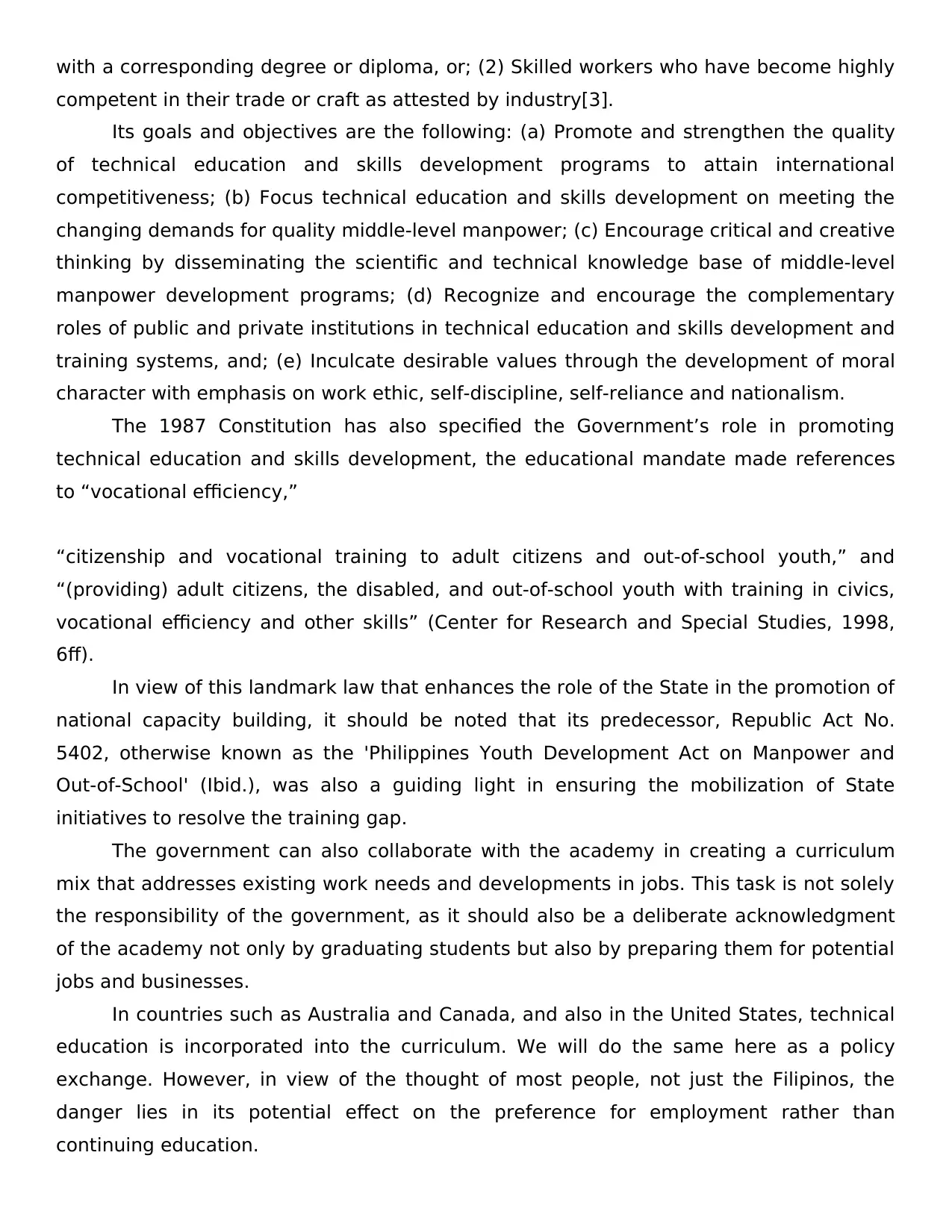
with a corresponding degree or diploma, or; (2) Skilled workers who have become highly
competent in their trade or craft as attested by industry[3].
Its goals and objectives are the following: (a) Promote and strengthen the quality
of technical education and skills development programs to attain international
competitiveness; (b) Focus technical education and skills development on meeting the
changing demands for quality middle-level manpower; (c) Encourage critical and creative
thinking by disseminating the scientific and technical knowledge base of middle-level
manpower development programs; (d) Recognize and encourage the complementary
roles of public and private institutions in technical education and skills development and
training systems, and; (e) Inculcate desirable values through the development of moral
character with emphasis on work ethic, self-discipline, self-reliance and nationalism.
The 1987 Constitution has also specified the Government’s role in promoting
technical education and skills development, the educational mandate made references
to “vocational efficiency,”
“citizenship and vocational training to adult citizens and out-of-school youth,” and
“(providing) adult citizens, the disabled, and out-of-school youth with training in civics,
vocational efficiency and other skills” (Center for Research and Special Studies, 1998,
6ff).
In view of this landmark law that enhances the role of the State in the promotion of
national capacity building, it should be noted that its predecessor, Republic Act No.
5402, otherwise known as the 'Philippines Youth Development Act on Manpower and
Out-of-School' (Ibid.), was also a guiding light in ensuring the mobilization of State
initiatives to resolve the training gap.
The government can also collaborate with the academy in creating a curriculum
mix that addresses existing work needs and developments in jobs. This task is not solely
the responsibility of the government, as it should also be a deliberate acknowledgment
of the academy not only by graduating students but also by preparing them for potential
jobs and businesses.
In countries such as Australia and Canada, and also in the United States, technical
education is incorporated into the curriculum. We will do the same here as a policy
exchange. However, in view of the thought of most people, not just the Filipinos, the
danger lies in its potential effect on the preference for employment rather than
continuing education.
competent in their trade or craft as attested by industry[3].
Its goals and objectives are the following: (a) Promote and strengthen the quality
of technical education and skills development programs to attain international
competitiveness; (b) Focus technical education and skills development on meeting the
changing demands for quality middle-level manpower; (c) Encourage critical and creative
thinking by disseminating the scientific and technical knowledge base of middle-level
manpower development programs; (d) Recognize and encourage the complementary
roles of public and private institutions in technical education and skills development and
training systems, and; (e) Inculcate desirable values through the development of moral
character with emphasis on work ethic, self-discipline, self-reliance and nationalism.
The 1987 Constitution has also specified the Government’s role in promoting
technical education and skills development, the educational mandate made references
to “vocational efficiency,”
“citizenship and vocational training to adult citizens and out-of-school youth,” and
“(providing) adult citizens, the disabled, and out-of-school youth with training in civics,
vocational efficiency and other skills” (Center for Research and Special Studies, 1998,
6ff).
In view of this landmark law that enhances the role of the State in the promotion of
national capacity building, it should be noted that its predecessor, Republic Act No.
5402, otherwise known as the 'Philippines Youth Development Act on Manpower and
Out-of-School' (Ibid.), was also a guiding light in ensuring the mobilization of State
initiatives to resolve the training gap.
The government can also collaborate with the academy in creating a curriculum
mix that addresses existing work needs and developments in jobs. This task is not solely
the responsibility of the government, as it should also be a deliberate acknowledgment
of the academy not only by graduating students but also by preparing them for potential
jobs and businesses.
In countries such as Australia and Canada, and also in the United States, technical
education is incorporated into the curriculum. We will do the same here as a policy
exchange. However, in view of the thought of most people, not just the Filipinos, the
danger lies in its potential effect on the preference for employment rather than
continuing education.
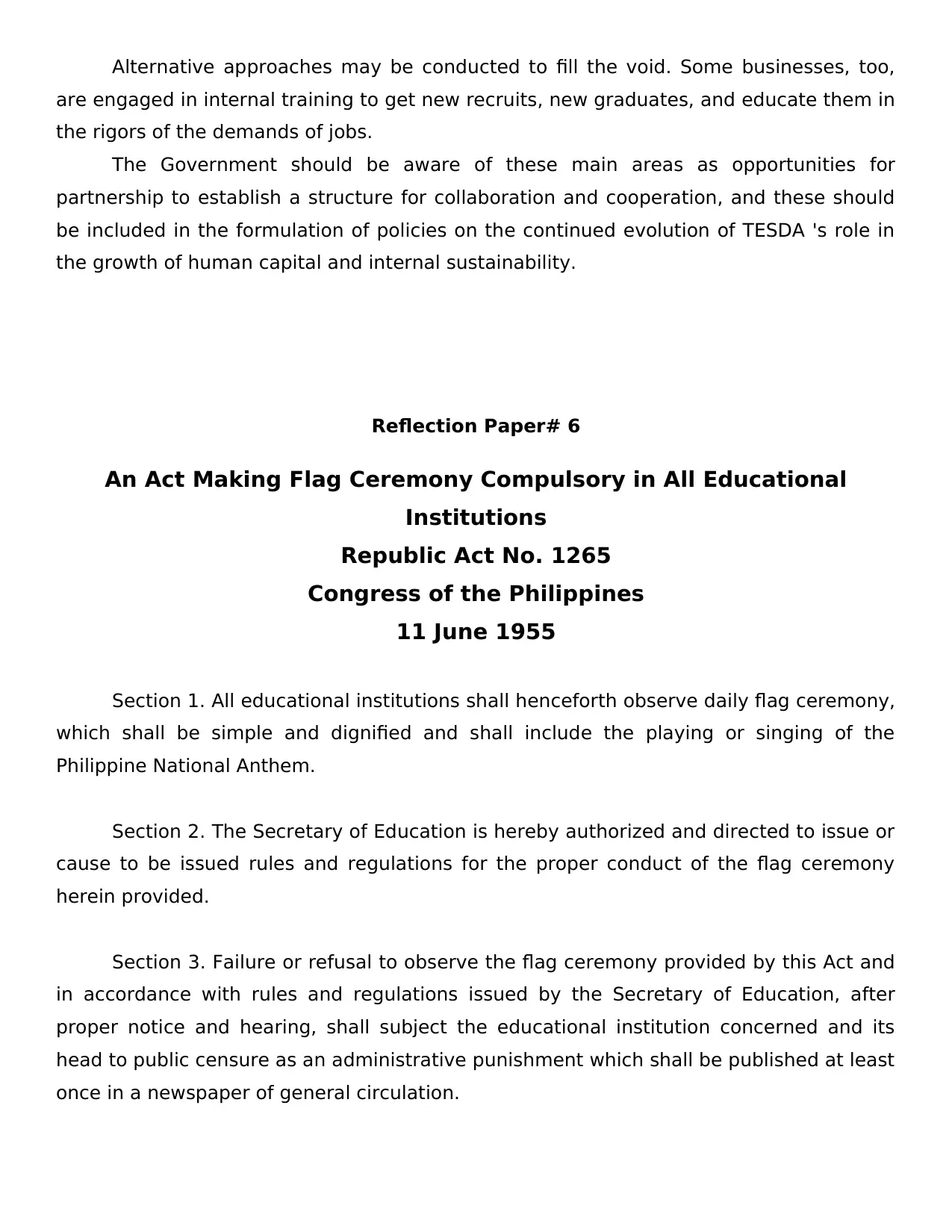
Alternative approaches may be conducted to fill the void. Some businesses, too,
are engaged in internal training to get new recruits, new graduates, and educate them in
the rigors of the demands of jobs.
The Government should be aware of these main areas as opportunities for
partnership to establish a structure for collaboration and cooperation, and these should
be included in the formulation of policies on the continued evolution of TESDA 's role in
the growth of human capital and internal sustainability.
Reflection Paper# 6
An Act Making Flag Ceremony Compulsory in All Educational
Institutions
Republic Act No. 1265
Congress of the Philippines
11 June 1955
Section 1. All educational institutions shall henceforth observe daily flag ceremony,
which shall be simple and dignified and shall include the playing or singing of the
Philippine National Anthem.
Section 2. The Secretary of Education is hereby authorized and directed to issue or
cause to be issued rules and regulations for the proper conduct of the flag ceremony
herein provided.
Section 3. Failure or refusal to observe the flag ceremony provided by this Act and
in accordance with rules and regulations issued by the Secretary of Education, after
proper notice and hearing, shall subject the educational institution concerned and its
head to public censure as an administrative punishment which shall be published at least
once in a newspaper of general circulation.
are engaged in internal training to get new recruits, new graduates, and educate them in
the rigors of the demands of jobs.
The Government should be aware of these main areas as opportunities for
partnership to establish a structure for collaboration and cooperation, and these should
be included in the formulation of policies on the continued evolution of TESDA 's role in
the growth of human capital and internal sustainability.
Reflection Paper# 6
An Act Making Flag Ceremony Compulsory in All Educational
Institutions
Republic Act No. 1265
Congress of the Philippines
11 June 1955
Section 1. All educational institutions shall henceforth observe daily flag ceremony,
which shall be simple and dignified and shall include the playing or singing of the
Philippine National Anthem.
Section 2. The Secretary of Education is hereby authorized and directed to issue or
cause to be issued rules and regulations for the proper conduct of the flag ceremony
herein provided.
Section 3. Failure or refusal to observe the flag ceremony provided by this Act and
in accordance with rules and regulations issued by the Secretary of Education, after
proper notice and hearing, shall subject the educational institution concerned and its
head to public censure as an administrative punishment which shall be published at least
once in a newspaper of general circulation.
⊘ This is a preview!⊘
Do you want full access?
Subscribe today to unlock all pages.

Trusted by 1+ million students worldwide
1 out of 21
Related Documents
Your All-in-One AI-Powered Toolkit for Academic Success.
+13062052269
info@desklib.com
Available 24*7 on WhatsApp / Email
![[object Object]](/_next/static/media/star-bottom.7253800d.svg)
Unlock your academic potential
Copyright © 2020–2026 A2Z Services. All Rights Reserved. Developed and managed by ZUCOL.





